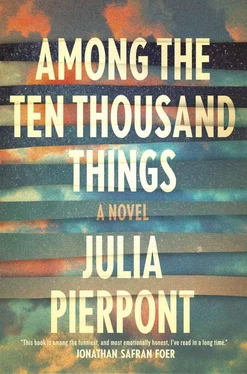Fine. Fine except Kay, in the corner, was thinking of things she wanted to say. At the museum she’d faced down the idea that liking her father required treason against her mother. She’d faced it down and found she might not have to feel that anymore. For a moment she’d seen the way out through all that had happened, which was like looking down one end of a bendy straw: tricky. She couldn’t see it anymore — she’d lost it somewhere on the walk home — but it had been there, flashing, when they were with Brown Bear.
It was something her mother couldn’t see and her brother wouldn’t try to, but she was not like Simon, she let things be taken away. Worry bullied her insides until she was back in her room, packing and putting on her PJs. Worry brought out the quiet in her. She lay down on her bed and listened to the sounds her family made.
In the kitchen the stove clicked on. Rice slid in all its pieces from a cardboard box. The printer was running in the back bedroom, and she could hear the cheerful chimes of text messages arriving on the other side of the wall.
Her father, eating in the living room, fork to plate. Hard to get those stubborn bits. Her mother, carrying a sheet of paper to the fridge, snapping it on under a magnet. In Simon’s room there were fewer friends to type to. People were going to bed.
Her mother on the phone with Ommy.
Her father turning pages of newspaper.
Her brother, talking without talking, late into the night.
Kay didn’t think she’d slept at all, only then it was light out, and there was her mother dressed and ready and Simon sitting under a storm cloud in the kitchen.
They were out by the elevator, her father supplying the saddest send-off from the door, when Kay threw down her bag and demanded they stay.
No. She didn’t. But she might have.
That would have been one way for life to go, of the thousands of ways it could splinter and fly off; it might have meant a new branch, or tree, if they hadn’t gone away or if they’d taken Jack with them. If they’d gone the next day, the next week. Even if she’d said something and Deb had not listened to her. That would have meant something too. But Kay, like her mother, was slow to make decisions. She didn’t trust her judgment and was afraid of being wrong.
So Kay was still in the hall, throwing down her bag, even as she was in a taxi, her legs crowding the hump of the middle seat, her mother to one side, printed e-tickets folded carefully around the bar codes, her brother on the other, turned aggressively toward the window. Something pounding on the radio filled the silence and still she was in the hall, saying no, her eyelashes sticking together in points, her crying bringing out that vein in her forehead and her dress gathered up in small fists she pressed into her sides. In the cab they hurtled downtown fast — it felt fast — even as everything outside slowed. They leaned against a long, lurching turn onto Seventh. A man on a street corner stepped off the curb, his coffee cup held up and away like a torch. The cabdriver’s name was Mamadou. And Kay was still in the hall, her brother holding the elevator, her mother bent down in front of her, clutching her mother’s face and saying, Listen.
Part Two: That Year and Those That Followed
They went. They were away two weeks.
Jack went too, a day or three later, though not to where they were. He brought the cat in a carrier to Ruth’s, where it moaned, homesick, and scratched the back wall of the closet, behind the coats.
—
For eighteen days the apartment sat empty. Fine dusts and pollen collected on the windowpanes and the mirrors stood with no one in them. Nothing in or out of the closed-circuit space. Only the wireless went on, invisibly complicating the air.
Folds in the mostly made beds sank deeper into themselves. Stains stayed stains, in the hampers and dresser drawers. In the kitchen, a milk-clouded spoon fixed to its bowl and magnets drifted down the refrigerator.
—
Then they came home, to the Ruth-gathered mail rubber-banded on the dining table and to everything — the graduated spines of books, rosettes on the living room rug — that looked suspiciously still.
—
The third week in July, the AC blew only hot air and they sat in front of fans.
—
Jack moved into his studio and then to a larger place in Sunnyside, Queens, with enough space for his work to live at home with him and for the kids to visit, when they were willing.
—
Deb moved, too: the bed to the opposite wall. Pillows at the foot of it.
—
For eleven August hours, they had the hurricane and bodega bags of ice.
—
Simon and Kay saw all the summer disaster movies in one trip to the Empire 25.
—
Jack and Deb stopped being married to each other.
—
That fall, Kay joined the field hockey team at school and spent the season on the bench beside the cooler, pressing grooves into the foam of her shin guards.
Simon became more and more like (this). He carried his videogames into his room and hooked them up to Jack’s old college television, which he got out of basement storage.
—
New Year’s, and a new year.
In Sunnyside, Jack began to work with smoke. He hung strips of paper like canopies from the ceiling and set fire to whatever was handy and burned powerfully, learning to make the blued white wisps rise in ways he wanted. He made the Manhattan skyline as it looked from a park on Vernon Boulevard, and the 59th Street bridge, its steel crosshatchings, from underneath like a zipper to the sky. Also the Shea Stadium parking lot and new baseball field, named for a bank. He held the smoking things high to make the darker marks, low and away for the flittering, coffee-stain singes. The kids spent one of their million weekends there, and the sliced hot dog and pasta Jack made for dinner tasted like burning.
—
Spring came and no one filled the ice trays. The glowing green clock on the oven fell an hour behind.
Isabel Davey’s book came out. The author photo, Izzy in high-contrast black and white, shoulders encased in something boat necked, made it impossible for Deb to find anything to wear the night of the party.
Deb? It’s me. I tried your cell.
It’s in the other room. In my bag.
What are you watching?
Jon Stewart.
Good?
Mmm. I haven’t really been paying attention.
My Internet here is for shit. I can’t stream anything.
You should call someone.
I’ve gotta get the guy in again. But it’s these walls, though. They’re concrete.
Listen. I can’t really talk.
Okay, if it’s a bad time—
That’s not why…Jack, hello? That’s not why.
Okay, yeah. Jeez.
—
Halloween. Reese’s wrappers and the wicks of silver Kisses papered the streets like leaves. Ruth took Kay to Jack’s opening at a gallery in Brooklyn, where there was only wine to drink and no one their ages.
In the kitchen, the oven clock synced back with time and Simon stood watching his Pop-Tarts revolve in the yellow hum. Deb said, “Maybe you should spend less time at sleepovers,” and Simon said, “Sleepovers, Mom, really?” He laughed and shook his head and said okay. She asked how was Donald anyway, and Simon laughed harder and said, “That fag.” She said, “Well, just please don’t stand so close to the microwave.”
Jack bought himself a Christmas tree and carried it home alone, hand-sized hole clipped into the plastic netting, fingers to blisters by the time he got home (no gloves).
—
New year. Snowflakes looked like skeletons of something else.
The oven clock became wrong again. Someone finally fixed it, so that the next November it fell an hour ahead. Kay auditioned for the school play, which was Our Town. She read for Emily and was cast as one of the mothers.
Читать дальше












